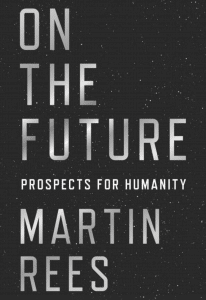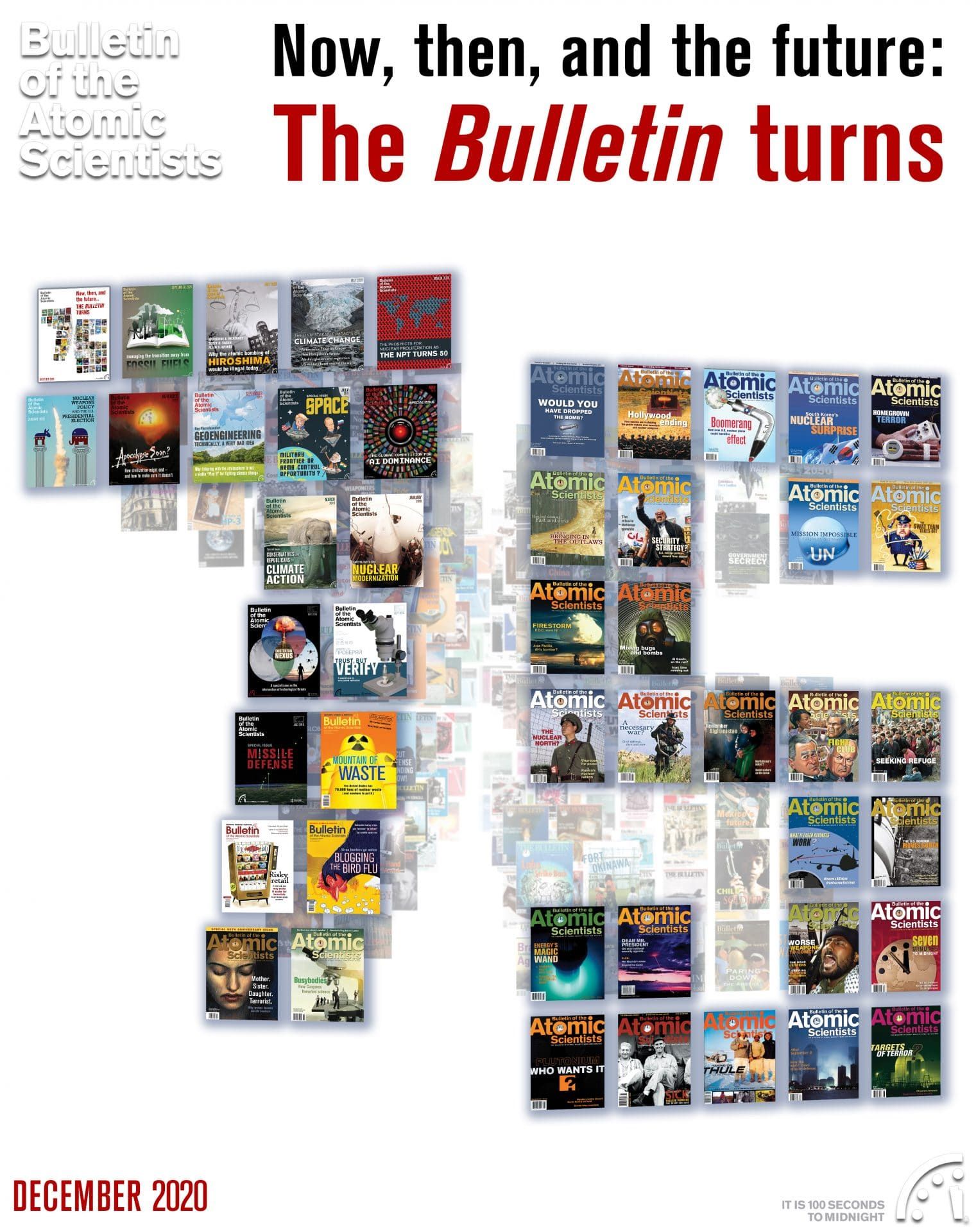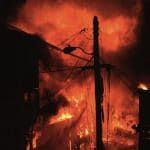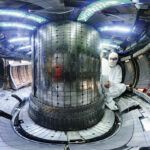Buckle up: We are in for a bumpy ride. An interview with Royal Astronomer Martin Rees
By Rachel Bronson | December 7, 2020
Buckle up: We are in for a bumpy ride. An interview with Royal Astronomer Martin Rees
By Rachel Bronson | December 7, 2020
Lord Martin Rees is the 15th Astronomer Royal, a position established by England’s King Charles II in 1675. He has served at the highest levels of science and is one of the world’s most recognized voices on existential risk. His career includes pioneering research on quasars, black holes, and galaxy formation. He is also the founder and leader of Cambridge University’s Center for the Study of Existential Risk.
A long-serving member of the Bulletin’s Board of Sponsors, Rees brings perspective to the Bulletin‘s 75th anniversary. His books—Our Final Hour and, most recently, On the Future—address fast-moving scientific advances and the risks and opportunities they present. In this interview with Bulletin CEO Rachel Bronson, Rees explains why he believes the 21st century will be a crucial test of humanity’s ability to manage a wide range of existential threats.
 Rachel Bronson:
Rachel Bronson:
Sir Martin, good morning. What a privilege to speak with you today. Notwithstanding all your contributions to 20th century scientific advancement, you’ve called the 21st century a uniquely crucial century. Could you elaborate on what makes it unique?
Martin Rees:
The population of the world has been rising very fast, and it’s now about 7.8 billion. It’s doubled in the last 50 years. We are each more demanding of energy and resources than our forebearers. We are causing stresses on the planet ecosystem, driving extinctions, driving climate change, etc. That’s one class of threats we need to be concerned with, which are new to this century.
The other class of concerns is those that stem from the fact that we have hugely advanced our understanding of the natural world, and we are empowered by powerful technologies. Of course, the big breakthrough was nuclear weapons 75 or so years ago. But now we have biothreats and cyber techniques that can be used for good, but allow, even small groups of people, to cause a cascading catastrophe. We are in a much more interconnected world; any disaster that happens in one region, one continent, will spread globally. We know that air travel allows viruses to spread in a few days. Panic and rumor can be spread at the speed of light by the Internet. We depend on supply chains which are global. And especially at the time when we are under this pandemic, we are fully aware of how interconnected our world is.
We are in an interconnected world where we are collectively putting pressures on our environment. And where, it’s possible, for error or terror to lead to catastrophes triggered even by quite a small number of people. That is why, I think, we’re going to have a bumpy ride through the century, and it’s going to be a big challenge for our politicians to cope with this.
Rachel Bronson:
How important is the distinction between bio- terror or error? You and I are speaking from our homes. COVID-19 has had an enormous effect globally. Does it matter whether it’s bio terror or bio error? Why is that distinction important?
Martin Rees:
Well of course it is important, because we need to do all we can to minimize the recurrence of these things. One of the reasons why we set up the center in Cambridge [the Centre for the Study of Existential Risk] is that the amount of attention given to minimizing the probability of massive catastrophes and their impact is a small effort, compared to the amount that’s devoted to minimizing modest things like carcinogens in food, road accidents, and the rest. We need to think more about these.
And if we’re thinking about natural pandemics, then of course the main issue is to make sure that the World Health Organization or some equivalent body immediately identifies any strange new disease in a Vietnamese farm or in a Chinese market or other places. But if we have the threat of engineered viruses, then of course, that requires other efforts—trying to monitor what could be done clandestinely by people in their labs. Although I would bet that this particular pandemic originated naturally by transfer from animals, we certainly can’t rule out the possibility that there will be future pandemics which are engineered.
And of course, people ask, “Well will this happen, because biological weapons haven’t been used very much in warfare?” The reason they haven’t been used very much is that their impact is not readily targetable, it’s not controllable. That’s why governments, and even terrorists with well-defined aims, don’t use bioweapons. My real nightmare is some crazy individual who thinks that human beings are far too numerous and are polluting the planet. Someone with that mindset, that extremist attitude with biotech expertise, could readily say, “Let’s just release a biological weapon.” That’s my nightmare scenario, and there are analogous cyberattacks nightmare scenarios as well.
So it does make a difference whether we’re thinking about something which is natural or something which is engineered, and if it’s engineered, whether it’s done at a nation-state level, or whether it’s done by a small private group. Or just one weirdo.
Rachel Bronson:
Many bio experts recognize that many of the same early warning and prevention research investments are needed, regardless of whether a biothreat is naturally occurring, terrorist, or a bio error; that we need to put in place a much more elaborate early warning system, much more elaborate preventative actions and communication channels between countries than we have now.
Martin Rees:
Yes, and indeed, in retrospect, it will be well worth spending a lot more. Because no one could have said that a pandemic like this was unlikely. In the last 20 years, we’ve had SARS and MERS, two other coronaviruses. And we’ve had influenza pandemics as well. To have a pandemic on a timescale of 10 to 20 years is something we should have, in a sense, expected. The unfamiliar is not the same as the improbable. And given that the impact of this pandemic is going to be something measured in maybe $10 trillion or thereabouts globally, it would, in retrospect, have been worth spending hundreds of billions of dollars as a sort of insurance premium to avoid it, or at least ameliorate its effects. If that had been spent, we’d already have all purpose vaccines against coronaviruses and preventative measures and all that, and more slack in our hospitals and all the rest. I think the lesson we should learn is it is worth spending substantial efforts in order to be prepared for these new emergent threats, which are getting more probable year by year.
Rachel Bronson:
You’re a member of the House of Lords, and you’ve advised on where investments should be made. How hard is it politically to push forward notions of prevention? Is there greater receptivity today?
Martin Rees:
The pandemic did come as a shock for which we were under-prepared. And I think we’re coping with it rather better now. As regards preparing for future disasters, there’s obviously a problem in that politicians don’t like being accused of wasting money. And if, for instance, as our government did in the past, you stock up on influenza vaccines, and there’s not an influenza epidemic that year, then you’ve wasted hundreds of millions of pounds. And our politicians are berated for that. Which is unfair, because if you spend money insuring your housing doesn’t burn down, you don’t think you’ve wasted the money. Lots of these preparations will indeed not be needed, but nonetheless, they are prudent precaution. I think people are realizing that we do need to spend more on these precautions.
I think also, we should realize that the climate crisis, the big global crisis, is in effect, as slow motion version of COVID. The COVID crisis came upon us in two or three months. And the climate crisis is of course something which is emergent on a time scale of decades. But again, we need to start preparing. It’s not going to be a sudden catastrophe, but we’re rather like the boiling frog trapped in a heated pan of water which doesn’t realize its predicament until it is too late. We don’t want to be in that situation.
The problem is that politicians tend to focus on the local and the short term, what happens before the next election and of course in their constituency in their country. And the preparation to combat pandemics has to be done globally. And in the climate context, one is asking people to spend money up front to ameliorate a possible global risk, which will have a bigger effect on other countries, for instance those in the tropics, than it will on us. And it will mainly affect future generations. We shouldn’t discount the future. We should care about the lifespan of babies born today who will be alive in the 22nd century. But it’s a difficult ask to get politicians to commit resources and time and effort to these long-term global issues when they obviously have urgent parochial ones.
How can we make sure they do, and also worry more about the nuclear issues? I think scientists can do their bit. Those who have the privilege of being scientific advisors to government or in their legislature can do a bit more, but not very much. In order for proper precautions to be taken against runaway climate change, against mass extinctions, and indeed against excessive risks of bio hazards, the public has to be behind it. And here we depend far more on ensuring that the issue is kept in politicians’ inboxes and in the press, and that the public cares.
That’s why we need charismatic individuals. We need lots of demonstrations. And these have been happening, of course, in the climate context. If you have charismatic individuals, they will influence lots of voters, and politicians will do the long-term thing if they believe they won’t lose votes thereby, if the public’s behind them.
Let me give two examples. I think the consensus that came about at the Paris climate conference in 2015 was very much facilitated by the interventions of the Pope and the papal encyclical that year, which was incidentally inspired by the Pontifical Academy of Sciences. And that encyclical brought the Pope a standing ovation at the UN and of course had influence on the leaders and the public in Latin America, Africa, and East Asia, where there are altogether about a billion Catholics. That really had a big effect on making it easy to get this consensus. That’s one example.
And to take a more parochial example in my country: Our minister for environmental matters, not a very enlightened person in general, introduced legislation to ban non-reusable plastics in drinking straws and such like. He wouldn’t have done this had it not been for the fact that there had recently been on BBC television the Blue Planet 2 TV series fronted by our secular pope, David Attenborough, which had shown in particular an image of an albatross returned to its nest and coughing up for its young not the longed for nourishment, but bits of plastic. That’s an iconic image for the concern about contamination of the oceans with plastic, rather like the polar bear on the melting ice flow is for the climate campaign.
And so in the UK, there’s a high awareness that plastic in the ocean is a serious environmental problem, and therefore a minister felt he wouldn’t lose votes by making this a long term provision to do a bit to reduce that contamination. This is a long-winded way of saying that scientists talking to politicians has limited traction, whereas scientists getting through to the wider public and enlisting charismatic figures to help them can swing public opinion, just as public opinion has been swung on many other issues in the last 50 years: gay rights, banning smoking, and so forth.
Rachel Bronson:
I was going back through some of the founding documents of the Bulletin and was struck by Manhattan Project scientists and their colleagues insisting the Bulletin engage the public directly. They understood that it was useful to have Einstein and others whispering in the ears of politicians, but they recognized full well that they needed public engagement. They believed that change in policy ran through citizens keeping pressure on their leaders to make the right decisions.
Martin Rees:
Yes, but scientists do have the responsibility and obligation, I think, to lead these campaigns. I like the analogy that Michael Atiyah, who was president of Pugwash, gave that you may not have very much control over the behavior of your teenage kids, but you are a poor parent if you don’t care. Likewise a scientist who doesn’t care about the use to which their ideas—their creations—are put is a poor scientist. Scientists should be concerned to optimize the benefit that stems from their ideas and to minimize the downsides. And I think, in that context, the Los Alamos scientists set a very fine example, because most of them returned with relief to their academic backgrounds after the war was over. But they felt they had an obligation to continue to campaign to control the power they had helped unleash. And that’s why they founded a Bulletin and Pugwash movement and organizations of that kind.
I’m old enough to have had the privilege of meeting many of these people in their old age: John Simpson, who recruited me to the Bulletin, the great Hans Bethe, and Joe Rotblat, and others. They were a wonderful generation. One reason why I got involved in organizations like Pugwash was that I realized that when that great generation was no longer with us, there had to be at least some people who carried the torch forward. They wouldn’t have the credibility or the expertise of that great pioneering generation, but there should be at least some scientists, and that’s something which has happened through the Bulletin and through FAS [the Federation of American Scientists] and other bodies in the United States.
Rachel Bronson:
And the Center for Existential Risk that you’ve created.
Martin Rees:
That’s another initiative motivated by the feeling that we should be willing to use our expertise and the convening power of our great university to address these issues, and as I put it, even if we can only reduce the probability by one part in 10,000, the stakes are so high that we’d have all earned our keep.
Rachel Bronson:
You have defined yourself as a technical optimist and a political pessimist. Can you unpack how one can be a technical optimist but a political pessimist? And then what should we do about that?
Martin Rees:
Well I think the evidence is all around us, because we have already the technology in electronics, AI, and medicine to provide a good life for all the people on this planet, 7.8 billion of them. And that’s not happening. We’re in a world where the 2,000 richest people in the world have enough money to double the income of the bottom billion. They’re not doing it. And where clearly there’s huge inequalities both within nations and between nations. And I think this is an indication of political or ethical failure. I should mention that I often am asked, “Aren’t things much better now than they were in the past?” People like Steven Pinker quite rightly point out the way in which life expectancy has gone up, literacy’s gone up, infant mortality’s gone down, etc., etc. And indeed these are true. And it is obviously thanks to advances in science, without which we couldn’t feed the present world’s population. Those who were alive in the Middle Ages, on average, had a miserable life compared to us.
But if you were alive in the Middle Ages, the era when they built the cathedrals, it was miserable, but there wasn’t very much that could be done to make it better. There wasn’t the scientific knowledge. Whereas now we are better off, but the gap between the way the world is and the way it could be is wider than in medieval times. There’s a huge gap between the world that could exist with even present technology—a peaceful world where all are reasonably equal and have a lifestyle pretty well as good as the one that people like us enjoy—and the actual one. So I would say there’s no evidence for any real ethical progress at the political level. And my pessimism is that governance is going to get harder, for the reasons I mentioned, because small groups can be more disruptive empowered by technology than they could in the past.
The fact that social media are so influential is, I think, not just a transient problem, but a long-term problem. Because in the old days, most people got their view of the world filtered through fairly responsible journalists who would muffle extreme opinions and try and give a balanced one. Whereas now the reverse is the case, because everyone has a voice, which is in principle a good thing, but that means that extremist content on social media gets far more traction. And of course, if you click on that you’re led to something far more extreme. So rather than getting a consensus, which traditional politics to some extent managed to achieve, then we are getting polarization because the extremes are amplified by social media rather than muffled as they would be by responsible national press.
Rachel Bronson:
Let’s not leave our discussion on that note, though, because that’s not where I want to finish our conversation. The Bulletin has turned 75; we were founded out of the ashes of Hiroshima and Nagasaki by scientists trying to engage the public, to make sure that never happened again. Seventy-five years later we remain committed to that mission, but there are many other challenges that we’ve been talking about in terms of technological advancement. If you were leading the Bulletin of the Atomic Scientists, where would you direct the attentions of the editorial team and others working to ensure that better policies were created around what kinds of technologies? How would you direct our organization?
Martin Rees:
Well, it would be presumptuous of me to offer comments, because you’re doing a very good job. I think the big transition you made was when you diversified from focusing solely on the nuclear issue and started worrying about environmental or climate change as security issues as well. And that was something which broadened, but in a sense diluted your impact. I think it’s important that we should do what we can through media like yours, which do have a wide circulation, to make people aware of the longer term. Because the worry is that people don’t think long term enough.
Just a moment ago I was talking about medieval times when they built cathedrals. And it may seem ironic that they built cathedrals that wouldn’t be finished in their lifetime even though their horizons then in space and time were very limited. They thought the world might end in a thousand years, and they’d never been outside their own country. Whereas now we don’t plan so much ahead despite the fact that we’ve got huge cosmic horizons and longer human lifespans.
But I think the reason why this is such a paradox is that in the Middle Ages people may have thought that the world would end in a thousand years, but they thought the lives of their children and grandchildren would be rather like theirs. And therefore they thought that their grandchildren would admire the finished cathedral, even if they didn’t live to see it. Whereas now changes are so fast that I don’t think we have any confidence in what conditions will be like for the next generation or the next generation but one, and of course that is an inhibitor of long-term planning. I’ve already highlighted one reason why politics is very hard for politicians, but that’s another one—that we genuinely don’t know how things will pan out. Everything’s now so complicated and interconnected and changes so fast. And that is something else which is going to make the challenge of this century very special.
So I think I feel vindicated in having, in my two books, emphasized that this century is especially challenging one for all those who have to run things, but it is an especially crucial one because, as I said at the beginning, it’s the first century when our species can either devastatingly foreclose the vast potential of human and post-human life here on Earth and far beyond, or trigger these exciting new developments in future centuries.
Together, we make the world safer.
The Bulletin elevates expert voices above the noise. But as an independent nonprofit organization, our operations depend on the support of readers like you. Help us continue to deliver quality journalism that holds leaders accountable. Your support of our work at any level is important. In return, we promise our coverage will be understandable, influential, vigilant, solution-oriented, and fair-minded. Together we can make a difference.





















